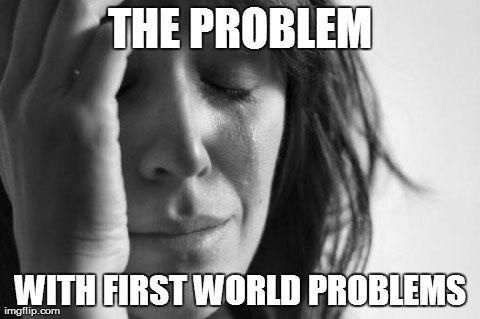By MARIANA ZEPEDA ’14
Online Editor
“Just broke an acrylic nail trying to change my iPhone cover.”
“I’m too tired to get up but too hungry to keep sleeping.”
“I put too much balsamic vinegar on my salad.”
#firstworldproblems
As much as I would love for “first world problems” to be a passing fad, it looks like the expression is here to stay. (Like so many other things, #firstworldproblems is worse in hashtag form). The phrase makes my blood boil and it’s taken some time for me to put my finger on why.
First of all, it’s time that the whole “first world”-“third world” dichotomy be put to rest. These classifications hail from the Cold War period, back when the world was divided into allies and enemies. Neutral, non-aligned countries occupied the place of the “third world,” while the “first world” consisted of countries in the United States’ sphere of influence and the “second world” referred to the communist-socialist states. But the Berlin Wall fell the year I was born, and it’s unbelievable that these hollow classifications have not faded throughout my lifetime. On the contrary, today the terms “first” and “third world” are used informally to distinguish between “developed” and “developing” countries. These terms are not only outdated but also far too simplistic to speak to the various nuances and complexities of the political and economic conditions of countries around the world. And yet we insist on resurrecting them in daily conversation.
The phrase “first world problems” follows trivial complaints, as though the act of acknowledging that there are worse things in the world sustains a person’s moral character, acting as a protective shield to insensitivity. You can’t be a bad person, it implies, even when you’re complaining about frivolous annoyances, because you realize that circumstances are worse for other people (that said, you’re going to go ahead and be dramatic anyway). It’s amazing how a phrase meant to signal self-awareness can act to utterly eliminate self-awareness.
Minor annoyances, petty problems—they make up our daily lives. We don’t always walk around contemplating larger-than-life questions (that would be paralyzing). Yes, these annoyances should not take center stage in our lives or shape the way we interact with what is going on around us. But we should not drain complaining of its value. I believe in the value of a well-aimed rant. And I don’t think it makes you any less smart or kind to get a little upset when something trivial doesn’t go your way. We are all superficial sometimes—admitting that you’re aware of the world’s tragedies does not preempt insensitivity. Go on, complain. Then rein it in, move on. Why invoke other members of the global community?
Because the worst part about this expression is the frankly dehumanizing implication that the people who inhabit these “third world countries” (#gag) cannot have room in their lives for trivial concerns. No, how can they have the capacity for pettiness when they are defined by the tragedies that absorb them? Back in 2011, Nigerian-American novelist Teju Cole took to Twitter to denounce this expression. He said: “People in richer nations need a more robust sense of the lives being lived [elsewhere in the globe]. Here’s a First World problem: the inability to see that others are as fully complex…as you are.” (Teju Cole, I salute you. Thank you for always saying things better than I ever could).
Furthermore, the expression not only ignores the existence of class stratifications within the so-called “third world,” but also suggests that the glorious “first world” is entirely devoid of quintessentially “third world” problems like poverty or conflict (#sure). Slate’s Joshua Keating recently published a fantastic article that describes the recent U.S. government shutdown in the same simplistic, patronizing tone so often used in reporting political conflicts elsewhere in the world. Keating makes a striking point; language both expresses and furthers the divide between how we see ourselves and how we see the rest of the world, a divide with important political implications. Maybe bridging that divide should start at the level of everyday conversation.
I don’t mean to downplay the existence of pain and grief and tragedy around the world. But the thing is, tragedy can engulf any society—and eclipse anyone’s trivial concerns—at any given time. It has nothing to do with our place on a map.
I do think there’s something to be said for the little pause that the expression promises, a slight hesitation after vocalizing an annoyance in which we realize how very lucky we are, in this particular moment in our lives, to have only silly things to complain about. The phrase is ultimately well intentioned; it promises perspective. But as it becomes more and more embedded into our collection of contemporary expressions, the utterance of “first world problems” simply masquerades as an instant antidote to insensitivity. It fails to meet its promise and does absolutely nothing to encourage us to pause and think.
Mariana Zepeda is a Mexico City-born English and History major. Follow her on Twitter @zepedamariana.




